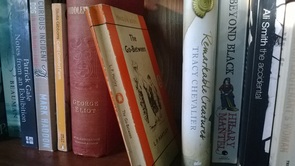
It’s happened to me a couple of times in recent months. The book in question was one of my favourite novels, namely – I kid you not – Never Let Me Go². I should’ve taken more notice because I’m bereft without it. I want to break into friends’ houses at the dead of night and go rummaging through their possessions till I find it. I’ve asked around of course, but no-one has fessed up.
Someone I care for and about, who cares for me in other important ways, doesn’t understand the sanctity of books? Okay, it’s not enough to break a friendship, but it rankles.
There are ways round this, of course. One is not to lend, but to forego the spontaneity and gift especially-purchased copies of my favourite books. Another is to lend only those books I don’t care if I lose. But what’s the point of doling out books I’m not particularly fond of? Only a mediocre friendship would rest on trading mediocre books. Yet whenever I’ve guiltily offloaded a stack of disappointing reads to a friend in lieu of taking them to the charity shop –guess what? Every one of those so-so books was dutifully returned.
The lending process has worked best for me on those odd occasions when I’ve liked, but not loved, a book but had in mind a friend who might enjoy it more. Thus R gets temporary custody of Red Strangers because she’s lived in Kenya and A gets The Marrying of Chani Kaufman because she met a young woman in Chani’s situation on a plane coming back from Jerusalem. If I ever meet those books again, it hardly matters if it’s on my bookshelves or my friends’.
Revisiting that gap on my bookshelves, a tattered copy of The Go-Between³ forces me to rethink. A few years ago, I happened upon that old favourite on my sister’s shelves. Was it originally mine, I wondered. My sister convinced me it was not. We talked about our love of the book, and then the conversation moved on. I’d forgotten all about it until, preparing to leave, I found it in my bag with a note from my sister inside. She wasn’t lending it to me, she was giving it. Knowing how much I wanted it, she was prepared to let it go. Years on, I’m moved by that act of generosity and shamed that I can’t match it.
It’s also slightly shaming to see my own attitude echoed in the unfulfilled protagonist of Alison Moore’s brilliant second novel, He Wants⁴:
Despite his efforts, though, despite the returning of all these books to the shelves, there are still gaps where there should not be gaps, spaces at which he stares, wondering what is missing, becoming anxious about books that might have been borrowed and might never be returned. (p17)
I wrote this post some time ago and, for some reason, never got round to sharing it. Now I’m a published novelist⁵, I’ve discovered another perspective on the theme. While I appreciate my novel being read, whatever the circumstances, it’s obviously better for me (not so much financially, but in sales statistics) if people buy their own copy, or even borrow it from the library. But, as others have found⁶, lots of people don’t buy books. That’s the sad reality of publishing, which you can read more about on the Writers and Artists website⁷. And while you’re there, check out my own contribution to the resource on working with a small independent publisher⁸.
What’s your attitude to sharing books? Do you enjoy giving others the opportunity to love what you’ve loved or do you struggle to let go? Has the advent of the e-book rendered all this possessiveness irrelevant? As an author, how do you feel about others sharing your books? Do let me know.
¹See my blog post: How Do You Arrange Your Literary Bookshelves? and/or a similar one from Caroline Lodge.
²For evidence of my obsession with this novel, see Romantic fiction for the unromantic, Any thoughts on slipstream fiction? or Don’t try to dictate what I should feel. There might even be others lurking in the archives.
³Because I’m obsessed with linking, I can’t help pointing out that my missing book and the one I’ve been gifted are examples of the country house novel.
⁴The Complexity of Desire: He Wants by Alison Moore
⁵Flogging the first, fixing the second and rewriting the third: am I now novelist?
⁶Who will buy your book?
⁷Writers and Artists advice
⁸Making small-press publication work for you
See also Sarah Brentyn admitting she doesn’t like her own childhood books messed up by her own kids.





















 RSS Feed
RSS Feed





















